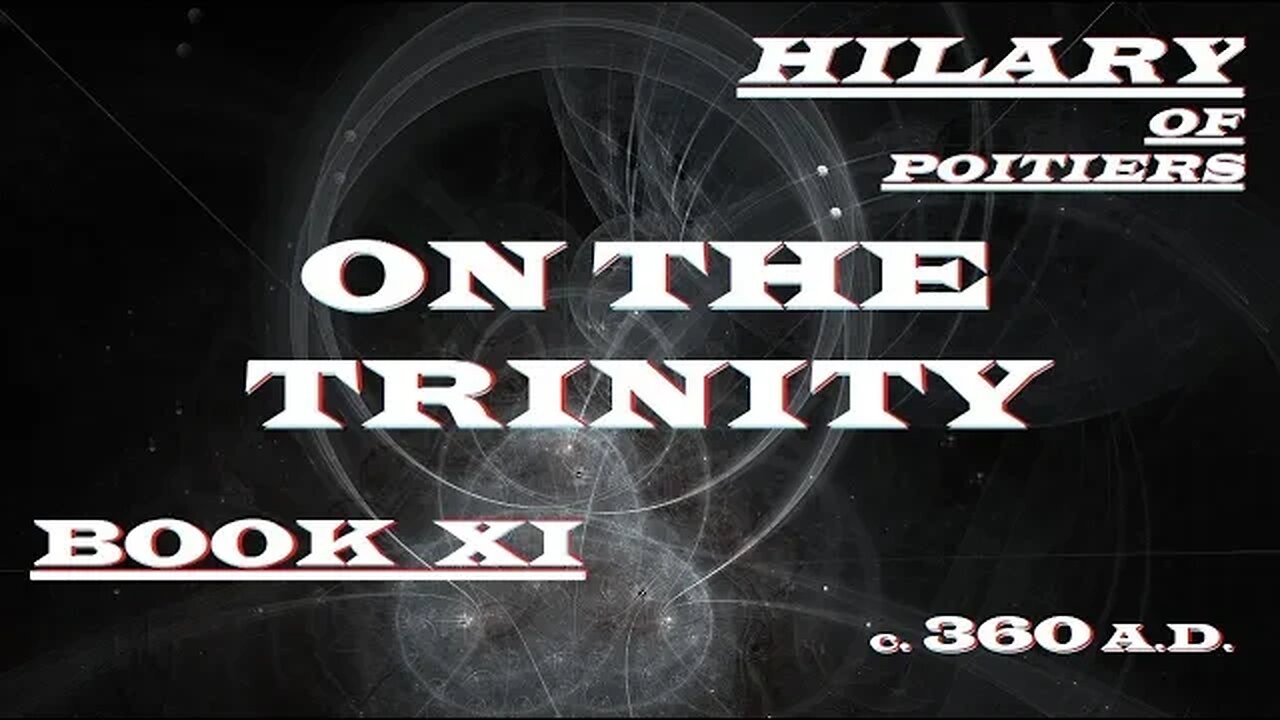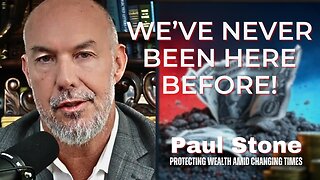Premium Only Content

Hilary of Poitiers - On The Trinity : Book 11 - c. 360 AD
Hilary of Poitiers / Hilarius Pictaviensis / Malleus Arianorum
DE TRINITATE
LIBER XI
And so — for not even the glory of the Resurrection has opened the eyes of these lost men and kept them within the manifest bounds of the faith— they have forged a weapon for their blasphemy out of a pretended reverence, and even perverted the revelation of a mystery into an insult to God. From the words,
I ascend unto My Father and your Father, to My God and your God
( John 20:17 )
they argue that since that Father is ours as much as His, and that God also ours and His, His own confession that He shares with us in that relation to the Father and to God excludes Him from true Divinity, and subordinates Him to God the Creator Whose creature and inferior He is, as we are, although He has received the adoption of a Son. Nay more, we must not suppose that He possesses any of the characters of the Divine nature, since the Apostle says,
But when He says, all things are put in subjection, this is except Him Who did subject all things unto Him, for when all things shall have been subjected unto Him, then shall also He Himself be subjected to Him that did subject all things unto Him, that God may be all in all.
( 1 Corinthians 15:27-28 )
For, so they say, subjection is evidence of want of power in the subject and of its possession by the sovereign. The eleventh book is employed in a reverent discussion of this argument; it proves from these very words of the Apostle not only that subjection is no evidence of want of power in Christ but that it actually is a sign of His true Divinity as God the Son; that the fact that His Father and God is also our Father and God is an infinite advantage to us and no degradation to Him, since He Who has been born as Man and suffered all the afflictions of our flesh has gone up on high to our God and Father, to receive His glory as Man our Representative.
In this treatise we have followed the course which we know is pursued in every branch of education. First come easy lessons and a familiarity, slowly attained by practice, with the groundwork of the subject; then the student may make proof, in the business of life, of the training which he has received. Thus the soldier, when he is perfect in his exercises, can go out to battle; the advocate ventures into the conflicts of the courts when he is versed in the pleadings of the school of rhetoric; the sailor who has learned to navigate his ship in the land-locked harbour of his home may be trusted amid the storms of open seas and distant climes. Such has been our proceeding in this most serious and difficult science in which the whole faith is taught. First came simple instruction for the untaught believer in the birth, the name, the Divinity, the true Divinity of Christ; since then we have quietly and steadily advanced till our readers can demolish every plea of the heretics; and now at last we have pitted them against the adversary in the present great and glorious conflict. The mind of men is powerless with the ordinary resources of unaided reason to grasp the idea of an eternal birth, but they attain by study of things Divine to the apprehension of mysteries which lie beyond the range of common thought. They can explode that paradox concerning the Lord Jesus, which derives all its strength and semblance of cogency from a purblind pagan philosophy: the paradox which asserts, There was a time when He was not, and He was not before He was born, and He was made out of nothing; as though His birth were proof that He had previously been non-existent and at a given moment came into being, and God the Only-begotten could thus be subjected to the conception of time, as if the faith itself [by conferring the title of 'Son'] and the very nature of birth proved that there was a time when He was not. Accordingly they argue that He was born out of nothing, on the ground that birth implies the grant of being to that which previously had no being. We proclaim in answer, on the evidence of Apostles and Evangelists, that the Father is eternal and the Son eternal, and demonstrate that the Son is God of all with an absolute, not a limited, pre-existence; that these bold assaults of their blasphemous logic — He was born out of nothing, and He was not before He was born— are powerless against Him; that His eternity is consistent with sonship, and His sonship with eternity; that there was in Him no unique exemption from birth but a birth from everlasting, for, while birth implies a Father, Divinity is inseparable from eternity.
-
 1:31:21
1:31:21
Tucker Carlson
3 hours agoBrigham Buhler: UnitedHealthcare CEO Assassination, & the Mass Monetization of Chronic Illness
94.6K93 -
 2:29:04
2:29:04
Nerdrotic
3 hours ago $5.99 earnedHappy New Years - Nerdrotic Nooner 454
41.2K2 -
 32:20
32:20
Rethinking the Dollar
3 hours agoThe U.S. Debt Crisis That Was "Made In America" w/ Paul Stone
22.1K5 -
 3:31
3:31
SLS - Street League Skateboarding
1 day agoCoco Yoshizawa’s 3rd Place Finish at SLS Tokyo 2024 | Best Tricks
24.1K3 -
 46:15
46:15
Grant Stinchfield
22 hours ago $7.09 earnedNew: The COVID Cover-up Revealed! Team Biden Caught in a Big Lie!
25.2K5 -
 2:35:08
2:35:08
The Shannon Joy Show
17 hours ago🔥🔥LIVE Exclusive W/Daniel Horowitz - New Year 2025 Analysis On Culture, Economy & Politics🔥🔥
29.9K7 -
 33:14
33:14
Tudor Dixon
3 hours agoThe World Walk with Tom Turcich | The Tudor Dixon Podcast
20.6K -
 7:29:48
7:29:48
PudgeTV
9 hours ago🔴 Gaming on Rumble - Marvel Rivals | Iron Man's Armory: Equipping Groot and Jeff for Battle
28.2K2 -
 1:58:48
1:58:48
The Charlie Kirk Show
3 hours ago2024 In Review + The Truth About H-1Bs | Girdusky, Carl | 12.30.24
88.4K22 -
 6:51
6:51
The Rubin Report
4 hours agoDave Rubin Reacts to Trump’s Greatest Moments
36.7K5